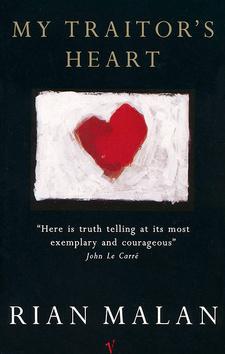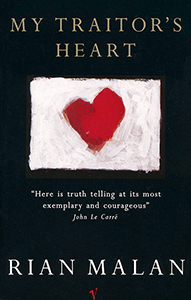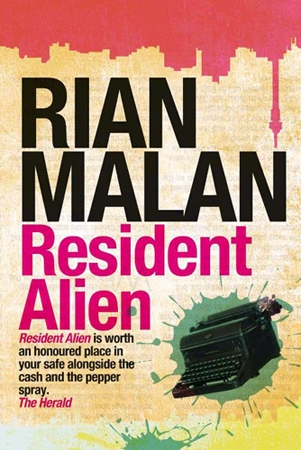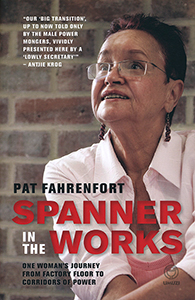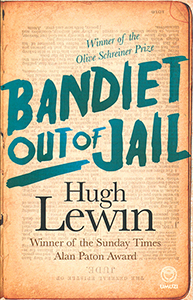My traitor's heart, by Rian Malan
Rian Malan's My Traitor's Heart is a tremendous book about candour, honour and race, a witness-bearing act of the rarest courage. No one who reads it could ever forget it.
Africa is a cruel country; it takes your heart and grinds it into powdered stone, and no-one minds.
Elspeth Huxley, The Flame Trees of Thika
[...] The road linking Mdukatshani to the village of Weenen is as bad as any other in Msinga. It winds along the riverbank, crosses the Bushman's River on a causeway, climbs a rugged hill, and heads on across the plain beyond. It is not a good road to drive in convoy. The wheels of the vehicle ahead raise clouds of choking dust and spray stones into your windshield, and if the vehicle ahead is a bus the journey becomes absolutely intolerable. One morning, Creina got stuck behind a lumbering bus on her way into town and ate dust for several miles. It was hard to overtake another vehicle on Msinga's dirt roads. In the end, though, she saw an opening, shot past the bus, and traveled on toward town. It was around Christmas 1978. The Alcocks had been in Msinga for three and a half years and were starting to feel less like strangers. Visitors' first impressions to the contrary, their first years in Msinga hadn't been all that easy. They were struggling to control the project's boundaries. A Zulu man who had given evidence on the project's behalf in a goat-theft case had been murdered for his trouble. Indeed, there had been many murders, but that was the nature of Msinga, reflected in its very place names. In Zulu, Tugela Ferry was known as Msbaya Safa - Hit Him till He's Dead. In Msinga, you could get killed for almost anything, for having the wrong name, or the wrong address, or plowing disputed land. Mdukatshani's black bookkeeper, Anton Hlongwane, was so scared of being murdered that he refused to send out notices to Zulu debtors. Still, the Alcocks had persevered in spite of all problems, and imagined they had already seen Msinga's worst side. But they had seen nothing, nothing, nothing. The bus Creina had just passed, for instance, was about to run into trouble. As it rounded a bend, a platoon of black men armed with rifles stepped into the road and forced the driver to halt. The gunmen boarded the bus, pulled five male passengers off it, and executed them. Creina knew nothing of this, of course. She drove on into Weenen, bought supplies, and headed back toward the project. En route, she found the road closed by a line of big boulders. The Zulus traveling with her were too scared to move, so Creina asked one of her sons to get out and roll the rocks aside. She had not been in Msinga long enough to know when to be afraid. A few miles farther on, at the gates of the project, she came upon a harrowing sight - a Zulu truck driver with a bullet in his abdomen, bleeding to death in Neil's arms. The driver had been ambushed at the line of boulders - the sixth man shot on that road in a single morning. What on earth was this? Where were the police? Where on earth was the ambulance? The fatally injured man had been lying in the sun for hours. An ambulance finally came, and the Alcocks retired to the rocks above the river, to recover from the traumas of the day. And then they looked up and saw something amazing: a skirmish line of heavily armed black men in military uniforms, advancing toward them on the river's far bank. The Alcocks had been in Msinga for three years, but this was their first sighting of a Zulu impi. Most whites would have fled in terror, but not Neil Alcock. He walked down to the water, cupped his hands, and yelled, 'Go away! We don't want you here with guns!' The Zulu warriors stood their ground. They had come to escort one of their brothers to safety, and wouldn't leave until he had crossed the river to join them. Then they retreated into the hills. [...]
This is an excerpt from the autobiography My Traitor's Heart, by Rian Malan.
Title: My Traitor's Heart
Subtitle: Blood and Bad Dreams. A South African Explores the Madness in His Country, His Tribe and Himself
Author: Rian Malan
Genre: Autobiography, Politics
Publisher: Vintage, London 1991
ISBN 0099749009 / ISBN 0-09-974900-9
Original softcover, 13 x 20 cm, 425 pages
Malan, Rian im Namibiana-Buchangebot
My traitor's heart
My Traitor's Heart is a famous book about an returning exile South African Afrikaner exploring the madness in his country, his tribe and himself.
Resident Alien
Resident Alien is a provocative and engaging collection of the best of Rian Malan's writings.
Weitere Buchempfehlungen
Resident Alien
Resident Alien is a provocative and engaging collection of the best of Rian Malan's writings.
Spanner in the works
Spanner in the works is an unflinchingly frank account of one woman’s resolve to speak truth to power, irrespective of where she discovers it.
'n Dans met die dood
'n Dans met die dood onthul diep ontstellende insigte in die gemoed van ’n anoreksielyer.
Sin, Sushi & Survival
Sin, Sushi & Survival are the gritty, heartbreaking and hilarious memoires of a woman’s astonishing journey.

